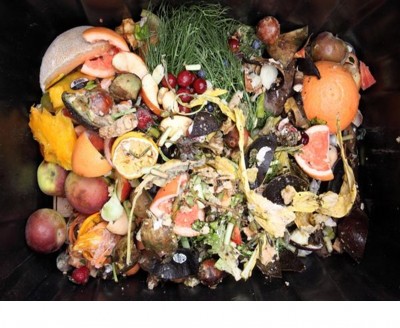Garbage Feeding Livestock
Amy Barkley, Team Leader & Livestock Specialist
Southwest New York Dairy, Livestock and Field Crops Program

Garbage Feeding Livestock
By Amy Barkley, Livestock Specialist, SWNYDLFC
Garbage feeding is the term for the practice of feeding food scraps, food waste, or food industry byproducts to livestock. For some, it provides the opportunity to supply cheap calories in the diet. For others, it's a necessary nutrient-rich component to make a cost-effective complete feed. Regardless, it's a way to utilize human food resources in a sustainable manner.
Feeding vegetarian scraps is not usually a problem, so long as the food is free of mold, excess bacteria, or decay. The regulations arise when it comes to meat scraps. There are many diseases that are transmitted through meat that can affect livestock. A couple of these include devastating and foreign animal diseases like African Swine Fever and Bovine Spongiform Encephalopathy ("Mad Cow"). Therefore, regulations have emerged for food scraps containing meat and animal by-products to be processed at 212 degrees Fahrenheit for at least 30 minutes by a licensed facility. This essentially heat sterilizes them. While the cooking process is required for feeding pigs food scraps, ruminants aren't to be fed the protein of any mammals to prevent the transfer of disease. With these restrictions in mind, it's best to avoid meat-based food scraps all together for all species to be on the safe side.
The good news is that you can feed any kind of vegetarian food scraps, including culls, peels, trimmings, and pulps. Bakery and fruit or vegetable waste from grocery stores is also commonly fed. Food processing waste such as bakery waste or brewer's grains are other options for a reduced cost livestock feed. Dairy waste, such as cheese rinds or whey also can be fed to livestock without the need to be heat sterilized.
All this said, if you're feeding animals that you harvest products from for home use only, household and food scrap regulations do not apply. These only apply to animals that produce meat, eggs, or milk that is sold.
Upcoming Events
Boots in the Barn: Cornell Dairy Research Updates
January 13, 2026
January 20, 2026
January 27, 2026
February 3, 2026
February 10, 2026
February 17, 2026
February 24, 2026
Join us for some or all!
Deerworm and Flukes in Small Ruminants Webinar
February 25, 2026 : Deerworm and Flukes in Small Ruminants Webinar
Dr. Mary Smith from Cornell's College of Veterinary Medicine and Dr. Rachel White from UMaine Cooperative Extension will be discussing the lifecycles, signs, prevention, and management of deerworm and liver flukes in small ruminants.
NYSDEC How to Get Certified Course
March 3, 2026 : NYSDEC How to Get Certified Course
Ellicottville, NY
NYSDEC training course in preparation to take the pesticide applicator exam.
Announcements
Cows, Crops & Critters Newsletter Sponsorship
TRYING TO REACH GROWERS AND AGRIBUSINESSES IN OUR SOUTHWEST REGION OF NEW YORK?Weekly Email Update: Shared with 625+ households who have signed up with our program.
Monthly Paper Mailer: To reach our stakeholders and farmers who lack internet access, we send out a monthly mailer where your company's logo and contact information would be featured with a mailing list of 330+ households.
If you sponsor our weekly and monthly publications you reach approximately 955 households.





